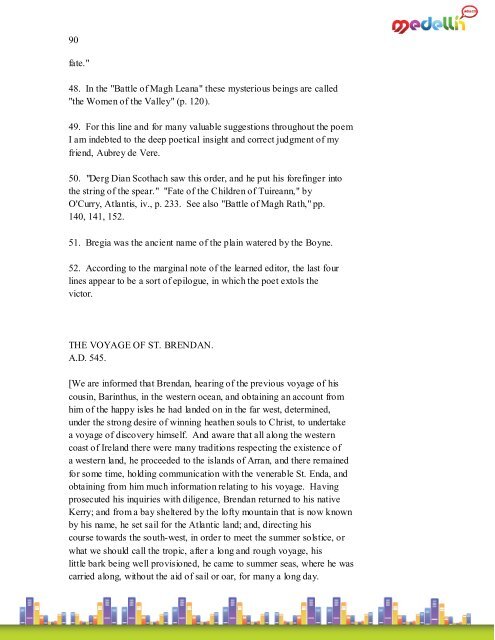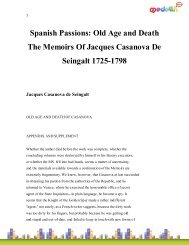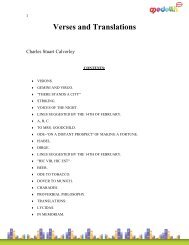- Page 1 and 2:
1 Poems MacCarthy, Florence Denis P
- Page 3 and 4:
3 Spanish Literature," new edition,
- Page 5 and 6:
5 Many of the earlier poems here co
- Page 7 and 8:
7 4. The following are the titles a
- Page 9 and 10:
9 Remonstrance Ireland's Vow A Drea
- Page 11 and 12:
11 BALLADS AND LYRICS. WAITING FOR
- Page 13 and 14:
13 Like a dream. The blue smoke upw
- Page 15 and 16:
15 The golden bells that deck the f
- Page 17 and 18:
17 13. Near the town is the "Fairy
- Page 19 and 20:
19 That cometh with years-- Bitter
- Page 21 and 22:
21 Music-shaken, It doth waken, Hal
- Page 23 and 24:
23 Shudder at their midnight madnes
- Page 25 and 26:
25 Heart-enchanting, Cythna, Genevi
- Page 27 and 28:
27 When I have knelt in the temple
- Page 29 and 30:
29 On the wing of the spring, comes
- Page 31 and 32:
31 Long as a Lapland winter, which
- Page 33 and 34:
33 My own dear isle! LOVE'S LANGUAG
- Page 35 and 36:
35 How poor or great may be my fate
- Page 37 and 38:
37 Truth, forget the constant beami
- Page 39 and 40: 39 Oh! none was to rival the prince
- Page 41 and 42: 41 At my window, late and early, In
- Page 43 and 44: 43 In fragrant sighs its heart reve
- Page 45 and 46: 45 For the summer is always there!
- Page 47 and 48: 47 The dread expanding force of the
- Page 49 and 50: 49 the agile spring so swift and li
- Page 51 and 52: 51 Though Domnal[42] it should be,
- Page 53 and 54: 53 Who hitherto have come to fight
- Page 55 and 56: 55 CUCHULLIN. If Conor's royal stre
- Page 57 and 58: 57 Unto the chariot, and he rode fu
- Page 59 and 60: 59 Last year it was in a vision of
- Page 61 and 62: 61 "Glad am I, O Cuchullin, thou ha
- Page 63 and 64: 63 Thence impetuous wilt thou grow,
- Page 65 and 66: 65 No, the great prize shall not by
- Page 67 and 68: 67 Like bees upon the wing on a fin
- Page 69 and 70: 69 And then they braced their two b
- Page 71 and 72: 71 And thus betwixt the twain this
- Page 73 and 74: 73 To fight the fight where my frie
- Page 75 and 76: 75 All these on me in turn shall so
- Page 77 and 78: 77 With such an easy effort that it
- Page 79 and 80: 79 As a huge mill-stone, cracking i
- Page 81 and 82: 81 He to have died and thou to have
- Page 83 and 84: 83 Ah! hapless deed, that still my
- Page 85 and 86: 85 First on the shore, as swift our
- Page 87 and 88: 87 The wave that swallows up the sh
- Page 89: 89 38. "The plains of Aie" (son of
- Page 93 and 94: 93 Like hooded monks before a dazzl
- Page 95 and 96: 95 I sought the rocky eastern isle,
- Page 97 and 98: 97 At length the long-expected morn
- Page 99 and 100: 99 Hail, spotless Virgin! mildest,
- Page 101 and 102: 101 Knowledge he tracked through ma
- Page 103 and 104: 103 But holding marble basilics and
- Page 105 and 106: 105 Her cold hands chilled the boso
- Page 107 and 108: 107 Bright, even as bright as those
- Page 109 and 110: 109 Rise up to God like morn and ev
- Page 111 and 112: 111 There never falls the rain-clou
- Page 113 and 114: 113 would be always visited and pro
- Page 115 and 116: 115 Sweetly the rising moonbeams pl
- Page 117 and 118: 117 To Desmond of the flowing strea
- Page 119 and 120: 119 If beauty decks with peerless c
- Page 121 and 122: 121 When all who live on Irish grou
- Page 123 and 124: 123 Thus rushed upon the doomed Mac
- Page 125 and 126: 125 Hangs the long leash that binds
- Page 127 and 128: 127 "If, when I reach my home to-ni
- Page 129 and 130: 129 "Thou'st bravely won an Irish b
- Page 131 and 132: 131 MacDonnells was at Glenarm. 85.
- Page 133 and 134: 133 And such was young Paolo! The m
- Page 135 and 136: 135 prayer. At morning when Paolo d
- Page 137 and 138: 137 And are bless'd in the name of
- Page 139 and 140: 139 But the tower in whose shade th
- Page 141 and 142:
141 Burning and withering, its drop
- Page 143 and 144:
143 his soul. For though sweet are
- Page 145 and 146:
145 Still some scenes are yet encha
- Page 147 and 148:
147 Need we say that Maurice loved
- Page 149 and 150:
149 As he sweepeth through the wild
- Page 151 and 152:
151 There's a crowding and a crushi
- Page 153 and 154:
153 100. The lusmore (or fairy cap)
- Page 155 and 156:
155 Advance! Through hope and work
- Page 157 and 158:
157 That can make thee rouse for it
- Page 159 and 160:
159 Still in the battle for Freedom
- Page 161 and 162:
161 Dark was my dream, though many
- Page 163 and 164:
163 Feel life has but one disaster,
- Page 165 and 166:
165 Who all the spring-time of thy
- Page 167 and 168:
167 We must spend the hour that fli
- Page 169 and 170:
169 The last great champion of the
- Page 171 and 172:
171 To be hushed, to be whipt, Its
- Page 173 and 174:
173 March 11th, 1856. 107. It is st
- Page 175 and 176:
175 A glorious wreath my happy hand
- Page 177 and 178:
177 Thine emerald robes are held fo
- Page 179 and 180:
179 Let us seek the wandering May,
- Page 181 and 182:
181 The wing`ed flame to the rosebu
- Page 183 and 184:
183 Of the life that follows this,
- Page 185 and 186:
185 Is with the flowers the time of
- Page 187 and 188:
187 Or following its devious course
- Page 189 and 190:
189 In Andalusia's Eden clime, Or '
- Page 191 and 192:
191 One, who is labour's useful tra
- Page 193 and 194:
193 Supports the mightiest crown on
- Page 195 and 196:
195 They twin'd their trembling han
- Page 197 and 198:
197 And grateful joy, the first and
- Page 199 and 200:
199 All their silvery stores, There
- Page 201 and 202:
201 Now with elf-locks dripping Fro
- Page 203 and 204:
203 Rises soaring to heaven in its
- Page 205 and 206:
205 Nought could resist his mighty
- Page 207 and 208:
207 The modest maiden May. Oh! she
- Page 209 and 210:
209 And as the thoughtless children
- Page 211 and 212:
211 And the young Year rose from hi
- Page 213 and 214:
213 THE FIRST OF THE ANGELS. Hush!
- Page 215 and 216:
215 And a blessing to the low. When
- Page 217 and 218:
217 Centenary Odes. O'CONNELL. AUGU
- Page 219 and 220:
219 And a voice rings out through t
- Page 221 and 222:
221 But soon had come the final com
- Page 223 and 224:
223 And grateful hearts invoked a b
- Page 225 and 226:
225 He slept by the soft Ligurian S
- Page 227 and 228:
227 In words though weak, in hues t
- Page 229 and 230:
229 The Homer of the West. He sings
- Page 231 and 232:
231 'Twas thus he sang, And while t
- Page 233 and 234:
233 The whole horizon fills. Or the
- Page 235 and 236:
235 The wit and song, the name and
- Page 237 and 238:
237 In visiting some bower, She sca
- Page 239 and 240:
239 'Tis Love, methought, blind Lov
- Page 241 and 242:
241 Thou by my side, fair vision, u
- Page 243 and 244:
243 Where scarce a flower that now
- Page 245 and 246:
245 Ah! wondrous is the lot of him
- Page 247 and 248:
247 And rob the heavens of stars fo
- Page 249 and 250:
249 What without me were all the po
- Page 251 and 252:
251 RECOLLECTIONS. Ah! summer time,
- Page 253 and 254:
253 Near to the lilacs round the po
- Page 255 and 256:
255 DOLORES. The moon of my soul is
- Page 257 and 258:
257 Of thy young heart's fond ambit
- Page 259 and 260:
259 'Tis Baiae, by a softer blue! G
- Page 261 and 262:
261 The songs melodious, which--a n
- Page 263 and 264:
263 The poet's dream--the lover's j
- Page 265 and 266:
265 And the ivy clothes the wall, T
- Page 267 and 268:
267 Let the spring-tide of Hope sen
- Page 269 and 270:
269 DARRYNANE. [Written in 1844, af
- Page 271 and 272:
271 115. The abbey on the grounds o
- Page 273 and 274:
273 Like thee, when wet with heaven
- Page 275 and 276:
275 'Tis warmed by an internal heat
- Page 277 and 278:
277 Their names be written in the B
- Page 279 and 280:
279 August 28, 1870. 119. Written d
- Page 281 and 282:
281 or 'girrinna.' The bird, at lea
- Page 283 and 284:
283 Ferdiah. line 69 [birds sing] {
















